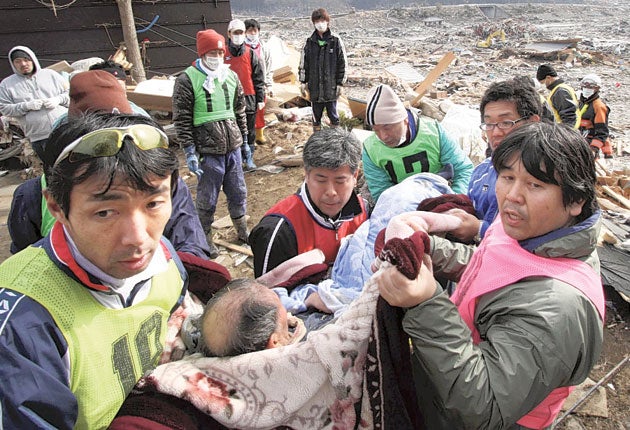A call goes out to the rest of Japan: send us coffins
Authorities struggle to cope with needs of the living and the dead

Your support helps us to tell the story
From reproductive rights to climate change to Big Tech, The Independent is on the ground when the story is developing. Whether it's investigating the financials of Elon Musk's pro-Trump PAC or producing our latest documentary, 'The A Word', which shines a light on the American women fighting for reproductive rights, we know how important it is to parse out the facts from the messaging.
At such a critical moment in US history, we need reporters on the ground. Your donation allows us to keep sending journalists to speak to both sides of the story.
The Independent is trusted by Americans across the entire political spectrum. And unlike many other quality news outlets, we choose not to lock Americans out of our reporting and analysis with paywalls. We believe quality journalism should be available to everyone, paid for by those who can afford it.
Your support makes all the difference.The toll from Japan's quake continued to rise yesterday as officials and survivors were confronted with the enormity of coping with thousands of dead as well as taking aid to the living.
As the ground continues to tremor because of aftershocks from Friday's quake, survivors on some of the most remote areas were surviving on little food and water as the authorities struggled to reach areas that remained cut off. "Things are simply not coming," said Hajime Sato, a government official in Iwate prefecture on the northeast coast.
"We have repeatedly asked the government to help us, but the government is overwhelmed by the scale of damage and enormous demand for food and water.
"We are only getting around just 10 per cent of what we have requested. But we are patient because everyone in the quake-hit areas is suffering. We have requested funeral homes across the nation to send us many body bags and coffins. But we simply don't have enough. We just did not expect such a thing to happen. It's just overwhelming."
Katsuhiko Abe, an official in Soma, a coastal city in Fukushima prefecture which is believed to be one of the towns worst affected by the tsunami, said the authorities were struggling to deal with the number of dead. "We have already begun cremations, but we can only handle 18 bodies a day," he said. "We are overwhelmed and are asking other cites to help us deal with bodies. We only have one crematorium in town."
People living on the coast spoke of how they ran from the huge tsunami wave that destroyed their communities.
"I thought I was going to die," said Wataru Fujimura, 38, a sales representative in the badly hit city of Koriyama. "Our furniture and shelves had all fallen over and there were cracks in the apartment building, so we spent the whole night in the car. Now we're back home trying to clean."
Kumi Onodera, 34, from Sendai, another of the badly damaged cities along Japan's north-eastern coastline, described the roads "moving up and down like a wave".
"You really come to appreciate what you have in your everyday life. Everything is so hard now," she said.
Another person from Sendai, the truck driver Koichi Takairin, 34, told of how he survived by sitting in his truck as the waters caused devastation.
"The tsunami was unbelievably fast [...] smaller cars were being swept around me," he said.
Although Tokyo has been largely untouched by the disaster, Graeme Melvin, a 28-year-old teacher from Edinburgh who works in Japan's capital, described the effects the earthquake had on his office and his disbelief that no one in his office had been hurt.
"Computers were falling off desks, chairs were being thrown over," he said. "As we made it outside into the huge car park, we turned to see the building literally moving from side to side, with the glass windows rattling as if being pounded by hurricane winds."
Sayori Suzuki, 34, a housewife from Minamisoma, said: "My brother works at the Fukushima nuclear power plant. I'm so worried about him because of the risk of radiation exposure."
However, despite the devastation and continued threat of radiation, as well as ongoing tremors, many voices reinforce the Japanese Prime Minister Naoto Kan's determined assertions that Japan will get through this disaster – with help from friends.
"Somehow, we can hang in there, I hope," said Yasue Schumaker, visiting her mother in Tohoku University Hospital in Sendai. "We don't have any electric, water, gas ... but please, help the people who lost their homes and the people on top of the buildings asking for help.
"We need foreign countries' help. We're in an emergency, please help us."
Join our commenting forum
Join thought-provoking conversations, follow other Independent readers and see their replies
Comments